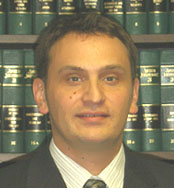

| THE SAINT PAUL PERSONAL INJURY ATTORNEY |
 |
 |
|
INSURANCE - when insured's significant other not 'dependent' under auto insurance policy or no-faultSTATE OF MINNESOTAIN COURT OF APPEALS A06-1235 Auto Owners Insurance Company, Respondent, vs. Chong Suk Perry, Appellant. Filed April 17, 2007 Affirmed Klaphake, Judge Scott County District Court File No. 70-CV-05-23329 Judith Mlinar Seeberger, Reding & Pilney, PLLP, 8661 Eagle Point Boulevard, Lake Elmo, MN 55042 (for respondent) Michael A. Bryant, Bradshaw & Bryant, P.A., 1505 Division Street, Waite Park, MN 56387 (for appellant) Considered and decided by Willis, Presiding Judge, Klaphake, Judge, and Shumaker, Judge. S Y L L A B U S A person who is the live-in significant other of an insured and who does not meet the definition of “dependent” under the insured’s automobile insurance policy or under Minnesota’s No-Fault Act may not receive survivor’s economic loss benefits from the insurer upon the death of the insured in an automobile accident. O P I N I O N KLAPHAKE, Judge Following the death of Daniel Savage in early 2005, appellant Chong Suk Perry sought survivor’s economic loss benefits from Savage’s insurer, respondent Auto Owners Insurance Company. Respondent denied appellant’s request on the basis that she was not a survivor within the meaning of the insurance policy because she was not Savage’s “dependent.” Appellant sought arbitration, which the district court stayed after respondent filed a complaint in district court seeking a declaratory judgment to determine whether appellant qualified as a dependent. The district court granted respondent’s motion for summary judgment, concluding that appellant did not qualify as a dependent under the insurance policy and that the policy met the minimal coverage provisions required by the Minnesota No-Fault Act. We affirm. FACTS On December 23, 2004, Daniel Savage was fatally injured in an automobile accident while driving a vehicle owned and insured by his employer, Kincaids Cars, Inc. Respondent provided personal injury insurance coverage to Savage’s survivors. As a result of the accident, respondent paid out ,000 in medical benefits and ,000 in non-medical funeral benefits. At the time of Savage’s death, appellant and Savage had lived together for seven years. According to appellant, she and Savage shared some expenses and a joint bank account, but she was financially dependent on him due to her inadequate income. Appellant made a claim to respondent for survivor’s economic loss benefits, which respondent denied on the basis that she did not meet the definition of a “dependent” within the meaning of the policy. Respondent’s policy provides for “survivors economic loss benefits” that includes “loss . . . of money or tangible things of economic value, not including services, that surviving dependents would have received from the eligible injured person for their support during their dependency.” The policy defines “dependent” as follows: 1. Dependent means: a. the deceased person’s surviving spouse who resided with the deceased person at the time of his or her death; b. a child of the deceased person while under the age of 18 years or while over that age but physically or mentally incapacitated from earning provided: (1) the child resided with the deceased person; or (2) received support regularly from the deceased person; at the time of his or her death. Dependency of the surviving spouse ends at remarriage or death. The dependency of a child who is physically and mentally able to earn ends when the child attains majority, marries or otherwise becomes emancipated or dies. After respondent denied appellant’s claim for economic loss benefits, appellant petitioned for no-fault arbitration, but the arbitration was stayed pending district court determination of the coverage issue. Respondent initiated a declaratory judgment action and later moved for summary judgment; the district court granted the motion, ruling that appellant did not meet the definition of “dependent” under the terms of the insurance policy and that the policy did not impermissibly restrict coverage in violation of the no-fault act. ISSUE Did the district court err in granting summary judgment to respondent because appellant did not meet the definition of a “dependent” for the purpose of receiving survivor’s benefits under respondent’s policy and the policy did not impermissibly restrict coverage under the Minnesota No-Fault Act? ANALYSIS The district court shall grant summary judgment if the pleadings, discovery, and affidavits show that there are no genuine issues of material fact and that either party is entitled to judgment as a matter of law. Minn. R. Civ. P. 56.03. “Generally, construction of a written contract is a question of law for the district court and therefore summary judgment is particularly appropriate.” Knudsen v. Transp. Leasing/Contract, Inc., 672 N.W.2d 221, 223 (Minn. App. 2003), review denied (Minn. Feb. 25, 2004). If the contract is unambiguous when the language of the contract is given its plain and ordinary meaning, construction of the contract is a matter for the court and summary judgment is proper. Denelsbeck v. Wells Fargo & Co., 666 N.W.2d 339, 346-47 (Minn. 2003). We will enforce an unambiguous insurance policy exclusion when it omits coverage required by law or violates an applicable statute. Lobeck v. State Farm Mut. Auto. Ins. Co., 582 N.W.2d 246, 249 (Minn. 1998). In interpreting respondent’s insurance policy, the district court concluded that appellant was ineligible for survivor’s economic loss benefits because she was neither a spouse nor a child of Daniel Savage and therefore did not meet the definition of “dependent” under the terms of the policy. We observe no error in this interpretation. The policy clearly and simply defines “dependent” as either a “surviving spouse” or “child of the deceased person.” See Colangelo v. Norwest Mortgage, Inc., 598 N.W.2d 14, 18 (Minn. App. 1999) (“[w]here terms of a contract are clear and unambiguous, there is no room for construction or interpretation”), review denied (Minn. Oct. 21, 1999). As a significant other or live-in girlfriend, appellant does not meet this definition of “dependent.” Further, even if the insurance policy could be construed to be ambiguous, she does not qualify as a “dependent” under the maxims of contract construction because the policy sets forth a class of persons who meet the definition of “dependent” and appellant is not enumerated in that class. See id. at 17 (“the expression of specific things in a contract implies the exclusion of all not expressed”). The district court also examined whether the policy coverage was within the requirements of the Minnesota No-Fault Act, which requires insurers to offer insurance coverage that satisfies the compensation purpose of the act, including offering survivor’s economic loss benefits. See Iverson v. State Farm Mut. Auto. Ins. Co., 295 N.W.2d 573, 575 (Minn. 1980); School Sisters of Notre Dame v. State Farm Mut. Auto. Ins. Co., 476 N.W.2d 523, 525 (Minn. App. 1991); see also Minn. Stat. § 65B.41-.71 (2004). The act defines a “dependent” for the purposes of survivor’s economic loss benefits, as a “wife” or “husband” of the deceased, or “any child” of a deceased parent. Minn. Stat § 65B.44, subd. 6. This definition is nearly identical to the definition of “dependent” included in respondent’s policy. Appellant claims that the last sentence of the act’s definition of “dependent” creates a broader class of dependents. This sentence states that “Questions of the existence and the extent of dependency shall be questions of fact, considering the support regularly received from the deceased.” Id. No Minnesota court has interpreted this language, although in Peevy v. Mutual Servs. Cas. Ins. Co., 346 N.W.2d 120, 122-23 (Minn. 1984), the supreme court examined the language in holding that an ex-wife of an insured was entitled to survivor’s economic loss benefits when the insurer’s policy permitted the coverage. But see School Sisters of Notre Dame, 476 N.W.2d at 525 (holding that non-profit corporation could not be construed as a dependent for purposes of the act). After giving various readings to the statute based on its language, legislative history, legal expert commentary, and comparison of the statute to the language of other statutes, the supreme court concluded that “[t]he preceding discussion makes clear that the survivor’s economic loss benefits statute is far from clear.” Peevy, 346 N.W.2d at 123. But absent a clear mandate in the language of respondent’s insurance policy, as in Peevy, or clear language in the no-fault act itself, we conclude that the district court properly ruled that the act does not offer a broader classification of “dependent” that would raise a question of fact regarding whether respondent’s policy should be read to include appellant as a “dependent” to satisfy the compensation purpose of the act. We therefore affirm the district court’s grant of summary judgment to respondent. D E C I S I O N Because appellant does not meet the definition of “dependent” under either respondent’s insurance policy or the Minnesota No-Fault Act, the district court properly ruled that she is not entitled to survivor’s economic loss benefits and granted summary judgment to respondent. Affirmed. |
|||||||||||||||||||||||||||||||||||||||||||||||||||||||||||||||||||||||
| By visiting this page or clicking the "submit" button above, you agree that you have read and accept this "disclaimer". |
||||||||||||||||||||||||||||||||||||||||||||||||||||||||||||||||||||||||
| Copyright ©
Michael E. Douglas, Attorney at Law, Saint Paul MN. All Rights
Reserved. Minnesota Lawyer representing Personal Injury, Car / Auto Accident, Workers Compensation, Medical Malpractice, Social Security Disability claims. Dedicated to Injured Workers, Victims of Negligence, Car Accidents, Victims of Fraud, and those in need of legal assistance. |